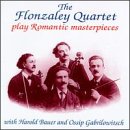Technique That Transcends Time
JMB1014 | USA | 06/30/2004
(4 out of 5 stars)
"I am aware of what the late historian E. P. Thompson meant by the condescension with which we tend to regard the past. I don't know what I was expecting when I bought this album, other than a document of an earlier day, but I was quickly put in my place. The Flonzaley are not merely one of the first string quartets to make a living playing music, they are amazing technicians and their artistry is impressive. These are notable performances. While the sound is not stellar, it is surprisingly decent and I have relished listening to these pieces as they flashed by, played with enthusiasm, passion and dash. If only some of the modern ensembles that pride themselves on fleetness of finger were as committed to the music as these artists."
Historical recordings, outstanding Schumann piano quintet
Discophage | France | 08/10/2006
(4 out of 5 stars)
"To me the most outstanding item in the valuable set (in excellent sound) is the Schumann piano quintet with Ossip Gabrilowitsch. It has a forward momentum that no other subsequent version that I know (Serkin-Budapest, Rubinstein-Guarneri, Bernstein-Juilliard, Entremont-Berg, Zacharias-Cherubini) even approaches. In the first movement the Flonzaley's initial tempo is brisk, and moreover, unlike all the others I mentioned, they never slam the breaks and linger when the lyrical second theme comes in and where Schumann doesn't instruct to do so. These people had understood a lesson that seems to have been forgotten since : the lyricism of a musical phrase should be expressed and will be all the more poignant within a given (and rather swift) tempo, and not by slowing down, coaxing the phrase and trying to rub it in (Bernstein, alas, is the worst in that respect, though his scherzo has a fabulous drive). The "funeral march" has all the wanted weight and the scherzo and finale again display the same kind of forward drive - all of which also makes me wonder what Leslie Gerber hears that he qualifies "gently romantic". This is rather "passionately romantic".
The Brahms quintet (with Harold Bauer) is good also, though not nearly as good and (especially in the finale) as profound as the Serkin-Bush from a few years later. As for the rest -Schumann's first, Brahms' third (shorn of most of its finale) and Schubert 15th quartets - be prepared for an interpretive style that sounds its age : plangent tone, some degree of portamento, "gemütlichkeit" rather than drama. I find that the Schubert is the one that suffers the most in such an approach. And be aware that that the latter is also heavily cut - but elegantly as well, and it won't be noticed unless you have the score or a good knowledge of the piece !
Anyway, Biddulph deserves be thanked for bringing back these historical interpretations to our attention.
"

